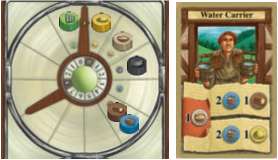
The appendix consists of two sections: a list of all Specialist cards and a Building tile index.
Appendix 1: the Specialist Cards

This is a detailed list of the 15 Specialist cards and their abilities. There are some general rules regarding basic goods and how they are indicated on the Production wheels:
When gaining basic goods, move the corresponding token in clockwise order.
When paying basic goods, move the corresponding token in counter-clockwise order.
You cannot move a basic good past sector 7.
Reminder:
Glass and Bricks are not considered basic goods.
You may remove Landscape tiles (Pits, Groves, Ponds) at any time from your Landscape board (but you may not remove Forest or Building tiles).
When you are allowed to use both abilities of a Specialist card, you may use them in any order.
General rules for all Specialist cards:
(P1) When gaining goods, you may take fewer goods than provided.
(P2) When gaining Food or Charcoal, you have to indicate the gain on one Production wheel or the other, your choice. You cannot split the gain between the wheels.
(P3) When paying 1 Food or 1 Charcoal (entry fees), you may use either Production wheel to indicate the payment.
Feudal Lord

There are three stacks of Building tiles. Draw a Building tile from each stack and place it face-up in front of you.
When building, you may build one of these instead of a building from the Building board. (There is no limit to the number of buildings you may have in your private offer).
Move the Wood token on the Glassworks wheel 1 space forward. Additionally, move the Clay token on the Brickworks wheel 1 space forward.
Pit Worker

Place a Pit tile on an empty space of your Landscape board and move the Clay token on the Brickworks wheel 1 space forward.
Move the Quartz sand token on your Glassworks wheel, or the Clay token on the Brickworks wheel forward by a number of spaces equal to the number of Pits you have.
Forest Manager

Place a Grove tile on an empty space of your Landscape board and move the Wood token on the Glassworks wheel 1 space forward.
Move the Food token on your Glassworks or Brickworks wheel forward by a number of spaces equal to the number of Groves you have (see P2). Alternatively, move the Wood token on your Glassworks wheel forward by that number.
Example: If you are the only player to play the Forest Manager, you may first gain a new Grove tile and place it on an empty space of your Landscape board.
Then choose Wood or Food, determine your total number of Groves and gain that number of Wood or Food according to your choice. Thus, the newly gained Grove has already paid back.
Pond Builder

Place a Pond tile on an empty space of your Landscape board.
Move the Quartz sand or the Water token on your Glassworks wheel forward by a number of spaces equal to the number of Ponds you have.
There are four Specialist cards which you can use to build buildings with.

Cultivator
Place a Pit, Grove, or Pond tile on an empty space of your Landscape board.
Pay the building costs of a building on the Building board and place it on an empty space of your Landscape board. Alternatively, build one of the buildings from your private offer (see Feudal Lord).

Example: If you are the only player to play the Cultivator, you may first gain a new Pond tile and place it on an empty space next to another empty space of your Landscape board. If you then build the Sand island on that other space, you will gain 2 Quartz sand.
Supplier

Choose one of the following types of goods: Charcoal, Food, Wood, Quartz sand, Water or Clay. You get 2 goods of the chosen type (mind P2 on page 12). Then each of your opponents also gets 1 good of that type.
In the solo game, you only get 1 good instead of 2.
Pay the building costs of a building* on the Building board and place it on an empty space of your Landscape board. Alternatively, build one of the buildings from your private offer (see Feudal Lord).
Details on the Supplier's First Ability
- When you choose Charcoal or Food, your opponents may decide individually which Production wheel they use to indicate the gain.
- Your opponents may refuse to gain the good.
- You cannot gain a good on a Production wheel that already has seven units of that good.
Example: Your opponent plays the Supplier to get 2 Wood, but you already have 7 Wood. However, if you have a Processing building that takes Wood as an input, you may use that building before gaining 1 Wood via your opponent's Supplier (see Anytime-actions).
Builder

Pay 1 Food (see P3). If you do not have any Food left or do not want to pay it, you cannot use the Builder. Regardless of that, it is still considered played and will reduce the efficiency of your opponents' Builders.
Pay the building costs of a building* on the Building board and place it on an empty space of your Landscape board. Alternatively, build one of the buildings from your private offer (see Feudal Lord).
Pay the building costs of a building* on the Building board and place it on an empty space of your Landscape board. Alternatively, build one of the buildings from your private offer (see Feudal Lord).
Note on the Builder:
If you carry out both building actions, carry them out separately and one after another. You may have to rotate the Production wheels in-between the two building actions.
Carpenter

Remove a Forest tile** from your Landscape board. If you do not have any Forest tiles left, you cannot use the Carpenter.
Move the Wood token on your Glassworks wheel 1 space forward.
Pay the building costs of a building* on the Building board and place it on an empty space of your Landscape board. Alternatively, build one of the buildings from your private offer (see Feudal Lord).
Keep in Mind:
The buildings in the middle row of the Building board have an ability that can only be used once during the game when the building is built.
There are buildings that have to be placed on top of the Start buildings (the so-called upgrades).
In most cases, building a building should not cause any problems. When in doubt, strictly abide by the following rules:
-
Pay 1 Food when playing the Builder. Remove a Forest tile when playing the Carpenter.
-
Unless you are building an upgrade for a Start building, you need to have at least one empty space on your Landscape board. Remove a Landscape tile (Pit, Grove, Pond) if needed.
-
On some rare occasions, you may have to rotate the Production wheels after removing a Landscape tile (e.g. when you have the Building Firm or the Builder's Hut).
-
Now pay the entire building costs of the building. Do not rotate any Production wheels while paying.
-
Once you are finished paying the building costs, you may have to rotate the Production wheels. (This might be the case when you use Glass or Bricks).
-
Place the newly acquired building on an empty space of your Landscape board (unless it is an upgrade for a Start building). If it is an upgrade for a Start building, place it on top of the appropriate Start building.
-
If the new building is a Processing building, you may now use it for the first time. If it is an Immediate building, you have to carry out its one- time effect immediately.
Slash-and-Burn Farmer

Remove a Forest tile from your Landscape board. If you do not have any Forest tiles left, you cannot use the Slash-and-burn farmer.
Move the Charcoal token on your Glassworks or Brickworks wheel 2 spaces forward (see P2).
Move the Food token on your Glassworks or Brickworks wheel 2 spaces forward (see P2).
Woodcutter

Remove a Forest tile from your Landscape board. If you do not have any Forest tiles left, you cannot use the Woodcutter.
Move the Wood token on your Glassworks wheel 2 spaces forward.
Move the Wood token on your Glassworks wheel 2 spaces forward.
All of the following Specialist cards have an entry fee. If you cannot pay the entry fee of a Specialist card, you may not use that card.
Regardless of whether you pay its entry fee or not, the card is still considered played. If your opponents have played it too, they may only use one of its abilities.
Clay Worker

Pay 1 Water.
Move the Clay token on your Brickworks wheel 2 spaces forward.
Move the Clay token on your Brickworks wheel 2 spaces forward.

Fuel Collector
Pay 1 Water.
Move the Charcoal token on your Glassworks or Brickworks wheel forward by a number of spaces equal to the number of Specialist cards left in your hand (see P2). This way you can get up to 4 Charcoal (or 5 in the solo game).
Move the Wood token on your Glassworks wheel 2 spaces forward.
Charcoal Burner

Pay 1 Wood.
Move the Charcoal token on your Glassworks or Brickworks wheel 3 spaces forward (see P2).
Move the Charcoal token on your Glassworks or Brickworks wheel 3 spaces forward (see P2).(P2 only applies to each ability individually. If you use both abilities, you may gain 3 Charcoal on one Production wheel and 3 on the other. You may of course gain all 6 of them on the same wheel).
Fish Farmer

Pay 1 Charcoal (see P3).
Move the Food token on your Glassworks or Brickworks wheel 2 spaces forward (see P2).
Move the Food token on your Glassworks or Brickworks wheel forward by a number of spaces equal to the number of Ponds you have (see P2).
Water Carrier

Pay 1 Food (see P3).
On your Glassworks wheel, move the Water token 2 spaces and the Wood token 1 space forward.
On your Glassworks wheel, move the Water token 2 spaces and the Quartz sand token 1 space forward.

Example: Even with the Water carrier, it may matter in which order you use its abilities.
Here, you may use both abilities, which is 4 Water in total, but you can only get 3 more Water.
If you use the second ability first, you will have to rotate the Production wheel after gaining the Quartz sand. Then you will have enough room for 2 more Water from the first ability.
Continue Reading

